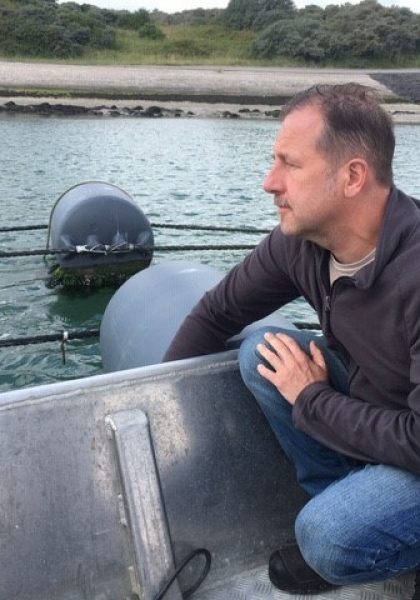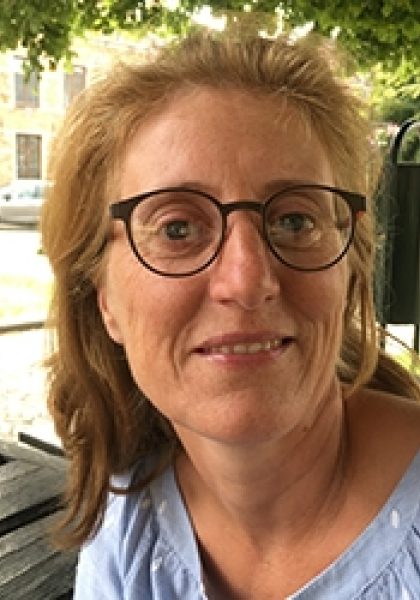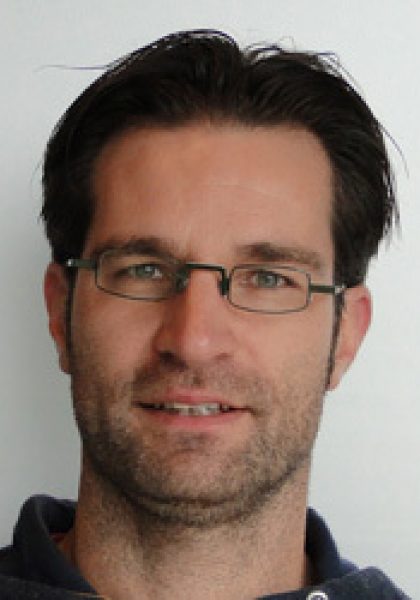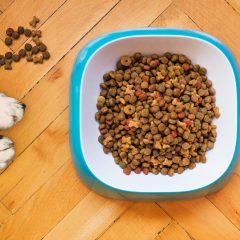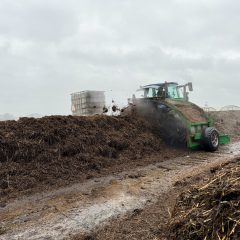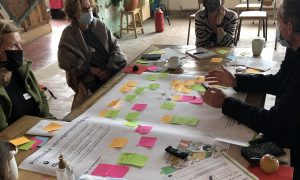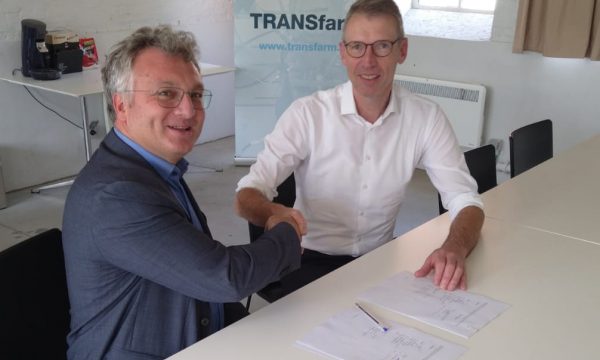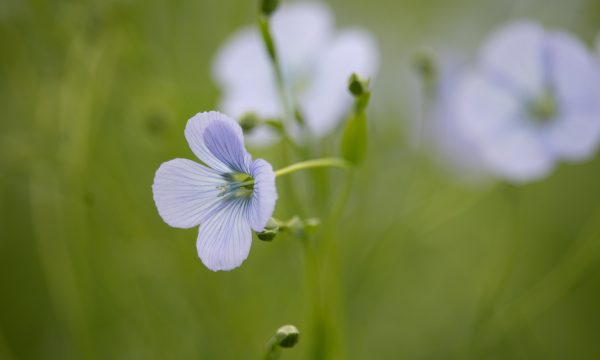Sector Bioeconomy
Entrepreneurs in the bioeconomy and producers looking for the best possible valorization of their biomass or residual flows will find an answer here to the question “what can ILVO do for me?”. You’ll get a brief overview of relevant expertise, analyses, infrastructure, and the professional approach that characterizes ILVO.
Quick links
What does ILVO do?
-
For potential applications in the bioeconomy, ILVO looks at both biomass released from classical production systems, such as agriculture and horticulture, and non-classical production systems, such as the cultivation of insects, algae, and other microorganisms.
ILVO has research expertise in new crops, such as miscanthus, marigold, and Russian dandelion, both in terms of cultivation techniques and the development of adapted harvesting equipment. In this research, ILVO critically evaluates whether the biomass can be produced and collected responsibly, with respect for natural resources, and without entering into competition with existing (sustainable) applications.
> Read also what ILVO does for arable farming, horticulture & ornamental cultivation, organic agriculture, aquaculture
-
ILVO also has specific research expertise in the valorization of residual flows released by various production systems, such as wet horticultural surpluses, used cultivation substrates, fish surpluses, shrimp peels, etc.
> Read also what ILVO does for horticulture & ornamental cultivation, organic agriculture, pig farming, poultry and rabbit farming, dairy farming, beef cattle farming, fishing industry, aquaculture and food production
-
Thanks to the Meet@all chromatographic-mass spectrometric measurement platform, ILVO has in-house expertise and equipment to identify and quantify interesting molecules in various biomass.
-
ILVO investigates different ways to collect and stabilize various forms of biomass efficiently and effectively. An additional difficulty is the small volume of wet waste streams in particular, which are often unpredictable and scattered throughout Flanders. Together with the parties involved, ILVO works on technically and economically feasible solutions to process these specific flows into a valuable end product.
-
ILVO has a licensed composting site and makes its expertise in farm composting available to test centers and individual businesses. ILVO also conducts research into the composition, the process, and the quality of the end products of composting and fermentation of organic waste streams, including animal manure.
> Read also what ILVO does for arable farming, horticulture & ornamental cultivation, organic agriculture
-
ILVO conducts research into the possibilities of sustainable cultivation substrates based on local biomass. Compost and plant fibers (wood fiber, miscanthus straw, heath chopper sod, flax loam, etc.) form a sustainable alternative to white peat in cultivation substrates. Moreover, plant fibers can be grafted to biocontrol fungi, which reduces the use of crop protection agents in primary production. Biochar and chitin can in turn make plants less susceptible to diseases and pests.
> Read also what ILVO does for horticulture & ornamental cultivation
-
Food and non-food productions are simulated on a semi-industrial scale in the pilot plant ‘Food Pilot’ set up by ILVO and Flanders’ FOOD. Over 50 devices are available, allowing a very wide range of operations for dairy, meat, fish, soups, sauces, vegetable products, bakery and chocolate, snacks, and animal feed. Food technologists are looking for time, cost, and energy savings via innovative processing technologies that also simultaneously maximize the preservation of taste and smell, nutritional value, food safety, and functional properties of raw materials. This not only for the classic primary products, but also for underutilized residual flows as raw material for the bioeconomy.
> More info: Foodpilot.be
> Read also what ILVO does for food production
-
ILVO has built up a broad network in the agrifood chain and the bioeconomy. As a neutral knowledge party, ILVO brings these partners around the table with an open mind. We work on ad hoc projects around concrete cases through co-creation in mutual trust. By using its expertise in systems thinking and system innovations, ILVO can uncover the mutual relationships in a sector and estimate how they will shift.
-
ILVO has experience in techno-economic analyses (TEA) and life cycle analyses (LCA) in the agrifood sector in order to estimate the feasibility and environmental impact of new applications in the bioeconomy, possible new crops, and the associated production processes.
-
ILVO participates in research to unravel the biosynthesis ‘pathway’ of interesting biomolecules or properties in raw materials. ILVO uses this knowledge to steer cultivation techniques, selection, and breeding in a targeted way. This is how ILVO wants to enable the primary sectors to grow raw materials that contain even higher levels of those desired biomolecules. An important focus is the overall sustainability of the entire production process.
> Read also what ILVO does for arable farming, horticulture & ornamental cultivation,
-
ILVO strives for livelihood security and a more stable income for all links in the agrifood chain, through economic business and sector analysis, research into profitability, added value, market competition, organization of sales, consumer preferences, and the role of cities and municipalities. In order to convert the theoretical knowledge from the research into recommendations that provide support for business leaders, ILVO builds useful web applications and tools.
How does ILVO work?
ILVO wants to support all stakeholders in the bioeconomy with the above broad palette of expertise and a modern research infrastructure. Contemporary challenges are handled by experienced professionals. Together with the other parties involved in the chain, they work on customized solutions.
Your ILVO guarantee
- Scientifically-based solutions
- Individual and/or co-creative guidance for innovation trajectories
- Confidential treatment of your question
- Clear and easy-to-interpret results that are applicable to day-to-day operations
- Technological support for various farm processes
Specialized research infrastructure
- > 200 ha trial fields
- > 15.000m² greenhouse infrastructure and climate chambers
- > 20,000m² experimental animal housing
- Experimental spaces with seawater tanks
- Composting site and compost reactor
- An accredited lab for soil, substrate and plant analyses
- Meet@all technology platform for characterization of biomolecules in biomass
- The pilot food processing plant "Food Pilot" equipped with >50 pieces of semi-industrial equipment
All ILVO expertises at your service
ILVO works in an interdisciplinary fashion and has a network of living labs that work closely together. A problem or question is therefore examined from many different angles by ILVO experts from different disciplines. This is guaranteed by ILVO's broad and systematic approach, together with the typical openness of the ILVO culture
Contact an expert
